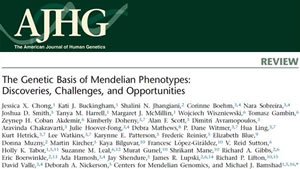Last updated: September 08, 2015
Aug 7 2015 Centers For Mendelian Genomics Program
Centers for Mendelian Genomics Program
In November 2011, NHGRI and the National Heart, Lung, and Blood Institute (NHLBI) established the Centers for Mendelian Genomics (CMG) program, the goal of which is to identify genomic mutations underlying Mendelian diseases using modern genome-sequencing technologies and to develop the most effective research approaches for uncovering the genetic basis of Mendelian diseases. Mendelian diseases, named after Gregor Mendel (the founder of modern genetics), are rare diseases that are typically transmitted from parents to offspring. While 'rare' at the individual level, Mendelian diseases are thought to collectively affect 25 million people in the United States. By identifying the genomic bases of these diseases, the CMG program aims to help improve their diagnosis and to inform the development of new treatment options. Through these efforts, CMG scientists also hope to gain insights into other, more common diseases that often involve similar genes and biological pathways.

CMG researchers recently published a milestone paper in the American Journal of Human Genetics reviewing their progress to date relative to all efforts in studying rare diseases and describing their perspectives about what it will take to find most of the Mendelian causal genes. They report data for 'Mendelian phenotypes' - a concept that captures a number of different factors that scientists are interested in studying. A Mendelian phenotype is the collection of observable or measurable traits of an individual and results from changes in a single gene that can be handed down from parents to children. Mendelian phenotypes include both disease and non-disease traits. Studying both kinds of traits can help find genes responsible for disease and build knowledge about human genetics.
As described in the publication, the collective work of the human genetics community has now identified mutations in 2,937 genes that account for 4,193 Mendelian phenotypes. This number represents only a fraction of known Mendelian phenotypes - there are over 3,100 additional Mendelian phenotypes for which genomic mutations have yet to be identified - and the number continues to increase each year.
Using 'next-generation' DNA sequencing technologies, the CMG program has made significant contributions to understanding the genomic bases of Mendelian phenotypes that complement the historically used, more traditional approaches. The CMG program strives to cultivate efficient designs, technologies, and analysis methods for the scientific community to reveal the genetic basis of Mendelian phenotypes. Specifically, it generated whole-exome sequence, which covers only the gene-coding portion of the genome (known as exons) along with closely-related on-off switch regions, for 16,226 samples as well as whole-genome sequence for 96 samples. As reported in the paper, the CMG program was able to associate 956 genes with a portion of the Mendelian phenotypes that they studied. Of these, 375 were not previously implicated in a Mendelian phenotype. This works out to be 3 discoveries per week!
The CMG program has developed a 'scorecard' for Mendelian phenotypes and gene discovery that can be found at mendelian.org/about-mendelian-conditions. This accounting system provides a framework that captures important metrics such as: the number of Mendelian phenotypes for which the responsible gene is known, the number of genes that are involved in a Mendelian phenotype, and the number of genes involved in two or more Mendelian phenotypes. All of these figures reflect the progress toward understanding the genomic bases of Mendelian phenotypes and diseases. As discovery progresses, we expect to see more Mendelian phenotypes identified and described, more genes implicated in Mendelian phenotypes, and ultimately, a greater understanding of the biological mechanisms for these phenotypes.
 |
Mendelian diseases and phenotypes are rare, enough so that for any one, there may be only a few appropriate samples to study. Therefore, it is essential that patients, families, clinicians, human geneticists, and the CMG program collaborate in order to bring together the samples, clinical data, scientific expertise, and genomic technologies. Towards that end, the CMG program has so far worked with 529 investigators at 261 institutions in 36 countries.
The CMGs coordinate with international efforts such as Finding of Rare Disease Genes (FORGE) in Canada and the Wellcome Trust Deciphering Developmental Disabilities (WTDDD) in the United Kingdom. The CMG program is also part of the International Rare Disease Research Consortium (IRDiRC). The CMG program has also developed web-based tools, such as GeneMatcher and Genotype to Mendelian Phenotype (Geno2MP), to provide a mechanism for investigators with shared interest in particular Mendelian phenotypes and candidate genes to collaborate.
This year marks the fourth year of funding for the CMG program and the end of its first funding period. During this time, NHGRI and NHLBI awarded a total of $48 million to three centers at the University of Washington, Yale University, and Johns Hopkins University. NHGRI and NHLBI have committed to supporting a second funding period for the program through the Centers for Mendelian Genomics (UM1) Request for Applications (RFA) issued earlier this year. New grants are expected to be awarded later in 2015 and be active for another four years. For more information regarding the CMG publication, see genome.gov/27562201/2015-news-feature-centers-for-mendelian-genomics-uncovering-the-genomic-basis-of-hundreds-of-rare-conditions/. Information about the CMG program and access to data can be found at mendelian.org.
Posted: September 8, 2015
